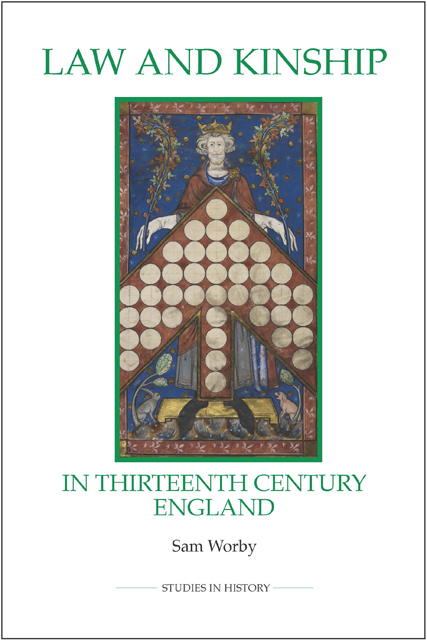Book contents
- Frontmatter
- Contents
- List of illustrations
- List of tables
- Acknowledgements
- Abbreviations
- Introduction
- 1 Canon law kinship structures
- 2 Common law kinship structures
- 3 The dominance of canon law kinship ideas
- 4 Kinship laws in practice
- 5 Trends underlying legal kinship structures
- Conclusion
- Appendices
- Bibliography
- Index
5 - Trends underlying legal kinship structures
Published online by Cambridge University Press: 01 March 2023
- Frontmatter
- Contents
- List of illustrations
- List of tables
- Acknowledgements
- Abbreviations
- Introduction
- 1 Canon law kinship structures
- 2 Common law kinship structures
- 3 The dominance of canon law kinship ideas
- 4 Kinship laws in practice
- 5 Trends underlying legal kinship structures
- Conclusion
- Appendices
- Bibliography
- Index
Summary
Kinship is and was multifarious. In the Middle Ages, as now, it extended far beyond learned or legal culture into everyday actions, norms and vernacular practices (each of which represent layers in people's understanding of it). Because legal kinship interacted with practice and knowledge in these areas in a non-straightforward manner it is possible to explore patterns of kinship in society through the filter of the legal structures. It is also possible to glimpse what uses of the formal kinship systems reveal about knowledge and understanding of kinship among non-experts. Beyond legal kinship were patterns of behaviour that suggest a general sense of kinship focused on blood kin and often the three-generation family. The dominance of legal kinship, however, particularly canon law kinship, left little space for any more formal non-legal kinship system.
Canon law patterns
To look beyond legal kinship it is necessary to get a sense of the behaviour underlying interaction with the law. In this case it is illuminating to explore the patterns of behaviour indicated through a sample of litigation records. The sample of cases used here are from the archbishop of York's consistory court in the fourteenth and fifteenth centuries and Ely consistory court in the fourteenth century (1374–81) as discussed by Donahue; the archbishop's court in Canterbury from the thirteenth century (using cases from after 1215 only); the court of the dean and chapter of Lincoln in the fourteenth century (1336–49); and the deanery of Wisbech in Ely in the fifteenth century (1458–84). They amount to fifty-nine cases including sixty-two instances where some form of ‘incest’ was raised as an issue (not that all these allegations can be believed); twenty-seven of these occurred in litigation between parties (seventeen from York, eight from Ely, two from Canterbury), and thirty-three in office cases, where the courts were exercising their quasicriminal jurisdiction (one from York, ten from Ely, twenty from Lincoln and two from Wisbech). Within the sample, kinship was one of the grounds for ‘divorce’ in seven cases; a defence against a case trying to enforce a marriage sixteen times; and one of the grounds for prosecutions twenty-eight times.
- Type
- Chapter
- Information
- Law and Kinship in Thirteenth-Century England , pp. 115 - 140Publisher: Boydell & BrewerPrint publication year: 2010

